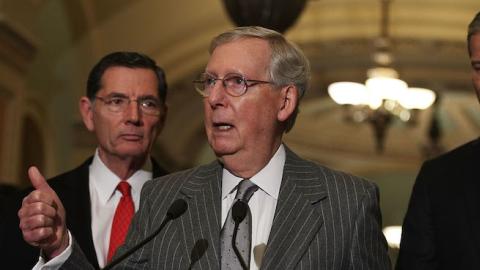As Republican efforts to repeal and replace Obamacare finally move out of the realm of speculation and into reality, there has been a great deal of misreporting on the role that the budget reconciliation process could play. Many reports have claimed that reconciliation, which requires only 51 votes in the Senate instead of a filibuster-proof 60, can be used for repeal but not for replacement. But neither half of this claim is really correct. Reconciliation can only be used for partial repeal, and it can likewise be used for partial replacement. In essence, it can used for repeal and replacement in equal measure.
The question of reconciliation’s possibilities is crucial, since Democrats are not yet showing many signs of being ready to jump off of the sinking U.S.S. Obamacare and into the waiting life rafts. So long as this is true, Republicans can muster 51 votes for repeal and replacement — if they can hold their own caucus together — but not 60.
The reconciliation process can be used only to pass legislative provisions whose primary purpose is “budgetary.” If a provision’s budgetary effects are “merely incidental” to that provision’s overall policy goals, the provision won’t qualify for reconciliation. The Senate parliamentarian is the one who regulates this process (but is subject to being overturned).
It is not entirely clear whether a provision must be an actual tax or spending provision to qualify for reconciliation, or whether it can merely be a regulation whose main effect is on taxing and spending. If the latter, then more things could potentially be in play. But the general consensus, albeit with some disagreement, seems to be that only taxing and spending provisions, or perhaps provisions that are necessary and proper for carrying into effect taxing or spending provisions, qualify for reconciliation.
This much seems clear: By using reconciliation, Republicans — along with any potential Democrats — can effectively repeal Obamacare’s widely despised individual mandate (or, more exactly, make its penalty $0), its employer mandate ($0 penalty), its subsidies to insurance companies, its Medicaid expansion, its tax increases, and whatever portion they wish to repeal of its Medicare raid. But premiums will likely still keep going up after such partial repeal, courtesy of Obamacare’s “community rating”— its invitation to buy insurance after one is already sick or injured without paying more for doing so — which likely isn’t touchable through reconciliation. (More on that below.)
At the same time, reconciliation can also be used to enact any parts of an Obamacare replacement that deal with the tax treatment of health care — the core of an Obamacare alternative. Take, for example, Dr. Tom Price's H.R. 2300, which has 84 cosponsors — including Jeb Hensarling, Trey Gowdy, and Marsha Blackburn — and is consistent with House GOP leadership's "Better Way" proposal. In its first 24 pages (1 percent as many as Obamacare's 2,400 pages), Price's legislation (which I played a role in helping to draft) calls for simple, flat (aside from three age bands), refundable tax credits for those who buy health insurance on their own — in the amounts of $1,200 for those under the age of 35, $2,100 for those between 35 and 50, and $3,000 for those 50 and over; plus $900 per child.
Those who don't use their whole tax credit to buy insurance could put the savings into a health savings account (HSA). Also in its first 24 pages, the bill calls for a one-time, $1,000-per-person HSA tax credit for having or opening an HSA. Through reconciliation, Republicans — along with any potential Democrats — could pass these middle-class-friendly provisions and finally end the tax inequity that has undermined the individual market for seven decades. And they would only need 51 votes.
In short, Obamacare can be partially repealed and partially replaced via reconciliation. However, the most damaging part of Obamacare — at least from the standpoint of making premiums skyrocket — would presumably remain. That's because repealing Obamacare's "community rating" provision probably wouldn't qualify as being primarily budgetary in nature, in which case that provision could only be repealed with 60 votes.
At least since the Renaissance, the core notion of insurance has been that one must buy it before the thing happens that one is protecting against. Obamacare's "community rating" provision upends this, mandating instead that insurers cover all comers at essentially any time, at no additional cost. It decrees that those who wait until they are already sick or injured to buy insurance cannot be charged any more than those who have maintained insurance all along. If one could wait to buy homeowners insurance until one's house is on fire, or could buy life insurance from one's deathbed — paying no more at that time — premiums would clearly explode. That's what Obamacare has done with health insurance. President Obama continually praised Obamacare's "preexisting conditions protections," but they are really a case study in the disastrous consequences of putting amateurish politicians and bureaucrats in control of an intricate system they barely understand.
More than half of the premium increases under Obamacare have likely been caused by this undermining of the traditional notion of insurance. It's the main reason that, if an Obamacare plan cost $3,750 in 2015, on average it costs $5,250 today — a 40-percent increase over just two years.
There should be commonsense protections for those with preexisting conditions. For example, those who get insurance through their job but then leave their job and buy insurance on their own, should not be charged more for a condition that was covered under their prior insurance. But substituting such sensible protections for Obamacare's redefining of "insurance" will likely have to wait until the Democrats realize that Obamacare is already sunk.
The good news is this: Aside from reining in insurance premiums by getting rid of "community rating" and replacing it with commonsense preexisting conditions protections that don't send premiums skyward, most of the rest of the repeal-and-replacement project can be accomplished through reconciliation. If Republicans proceed in a strategic and coordinated way, a great victory could lie just over the horizon.


















